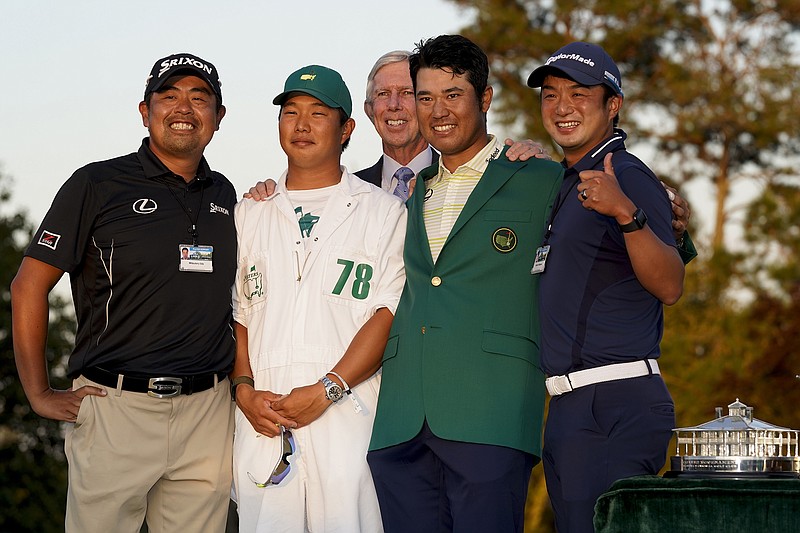Imagine carrying the sports hopes of your entire country on your shoulders. And not just the hopes that you'll become one of a handful from your golf-crazed nation to win the Masters, but instead the very first. Ever.
Oh, and not just the first person from your country to win the Masters. You would be the first man born in your country to win any major championship. Period.
That's what Hideki Matsuyama faced as he began the final round of the Masters on Sunday at Augusta National Golf Club. Hold on to to at least one shot of that four-shot lead he had at dawn, and he would become Japan's biggest sports hero, the instant favorite son of the land of Land of the Rising Sun and the likely choice to light the Olympic flame this summer in Tokyo if the postponed Olympics can be staged amid the coronavirus pandemic.
Pressure?
Matsuyama would later tell CBS announcer Jim Nantz through an interpreter: "My nerves didn't start on the second nine. They were there right from the start. They didn't end until the last putt."
Yet somehow he hung on and won golf's most cherished prize, holding off runner-up Will Zalatoris, the 24-year-old Wake Forest product, by a single stroke.
"Hopefully, I'll be a pioneer," Matsuyama continued through the interpreter when asked about the impact he could have in his country on golf, which trails only baseball and sumo wrestling on the list of Japan's favorite sports. "Open the floodgates for other Asian golfers to succeed."
If this Masters didn't exactly open the floodgates to the return of pre-pandemic normal, it did seem much closer to the Masters we've come to know, love and expect for most of the past 85 years, rather than that autumn alternative Dustin Johnson won without fans at Augusta National last November.
No, there weren't nearly as many of those fans - oops, patrons - as most years, though most who were there wore their masks and took their folding chairs with them from hole to hole because, unlike prior years, you weren't supposed to leave the chair unattended.
And because of that, the roars didn't exactly rise to a Beethoven's Ninth crescendo on Sunday's back nine as they have so often seemed to when Jack Nicklaus or Tiger Woods or even former Georgia Bulldog Bubba Watson was making a stunning and storied charge to victory.
In some ways, it almost seemed fitting that this was the atmosphere that would surround Japan's first winner, given that politeness and manners and etiquette have so long defined Japanese culture.
Of course, a little like so many Tiger triumphs at so many majors, the Masters included, no one made a real run at Matsuyama. Xander Schauffele pulled within two going into 16, then promptly triple-bogeyed to end any serious threat. According to CBS, it was the first time Schauffele had ever made a triple bogey in a major, a span that covered 1,041 holes.
Zalatoris did make a long par putt on 18 to stay within two, but even then all Matsuyama had to do was bogey 18, which he did.
What's more impressive, and at least equally surprising, was how Matsuyama was the only golfer on the course late Saturday to take advantage of softened greens after a rain delay. He played the final eight holes of the third round in 6 under to shoot a 65.
With the best of the best on the course, the greens begging to be humbled, only the 29-year-old from Japan obliged among the Georgia pines, dogwoods and azaleas.
Come Sunday, every brief charge at Matsuyama was followed by a fallback, those wickedly fast greens refusing to happily yield birdies.
What this means for the sport in general could be much or little moving forward. On the one side, 17-year-old Tsubasa Kajitani of Japan won the Augusta National Women's Amateur in a playoff just the weekend before. Couple that with Matsuyama's historic victory, and golf could certainly explode in Asia in much the way golf opportunities in this country blossomed for minorities after the rise of Woods in the mid-1990s.
Golf has long been as generally competitive worldwide as tennis or soccer, and now Japan has a winner of a major to further encourage its youth. But then an ESPN story from Sunday quoting 2013 Masters champion Adam Scott, who's from Australia, made it sound as if Matsuyama already had quite considerable stature in Japan, Scott saying: "He's a bit like a Tiger Woods [is] to the rest of the world, Hideki in Japan."
Now the rest of the world will know Matsuyama is capable of winning the same green jacket Tiger has won five times and Nicklaus a record six.
Will we remember this one as we did so many of those? Maybe not.
The winner played good, not great, golf down the stretch. He survived more than thrived. But this was also the eighth time in the past 10 Masters a first-time champ has prevailed, and the second time since Scott won in 2013 that the winner was the first from his country to slip on the green jacket. The times they are a changin' in everything.
Or as three-time Masters winner Nick Faldo, a native of England, observed late Sunday as CBS wrapped up its coverage: "This is a huge and wonderful result for global golf."
Added Woods in a Tweet as he recovers in Florida from his recent automobile crash: "This historical @TheMasters win will impact the entire golf world."
It certainly couldn't come at a better time for golf around the world as a global pandemic rages on.
Contact Mark Wiedmer at mwiedmer@timesfreepress.com. Follow him on Twitter @TFPWeeds.

